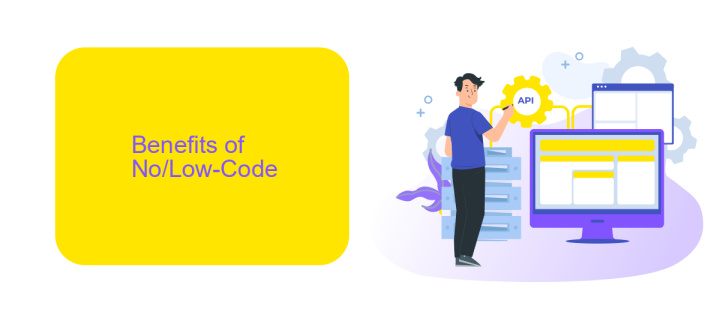No/Low-Code
No/Low-Code platforms are revolutionizing the way businesses approach software development. By enabling users to create applications with minimal or no coding knowledge, these platforms democratize the development process, reduce time-to-market, and lower costs. This article explores the benefits, challenges, and future prospects of No/Low-Code solutions, and how they are reshaping the technology landscape.
What is No/Low-Code?
No/Low-Code platforms are revolutionizing the way businesses develop software applications by enabling users to create and deploy applications with minimal or no coding experience. These platforms provide intuitive visual interfaces and pre-built templates, allowing users to drag and drop components to build applications quickly and efficiently.
- Visual Development: Users can design applications using a graphical interface.
- Pre-Built Templates: Ready-made templates for common use cases.
- Workflow Automation: Automate repetitive tasks without manual coding.
- Integration Capabilities: Easily integrate with other systems and services.
One of the key advantages of No/Low-Code platforms is their ability to integrate with other software and services seamlessly. For instance, ApiX-Drive is a service that simplifies the process of setting up integrations between different applications. By using ApiX-Drive, businesses can automate data transfer and synchronize information across multiple platforms without writing a single line of code, thus enhancing productivity and reducing errors.
Benefits of No/Low-Code

No/Low-Code platforms offer numerous benefits, making them an attractive option for businesses of all sizes. One of the primary advantages is the significant reduction in development time. By enabling users to create applications through intuitive drag-and-drop interfaces, these platforms eliminate the need for extensive coding knowledge, allowing for faster project completion and quicker time-to-market. Additionally, they empower non-technical staff to contribute to the development process, fostering greater collaboration and innovation within teams.
Another key benefit is the ease of integrating various services and systems. Tools like ApiX-Drive facilitate seamless integration by providing a user-friendly interface for connecting different applications without requiring deep technical expertise. This not only streamlines workflows but also ensures that data flows smoothly across systems, enhancing overall operational efficiency. Furthermore, the cost savings associated with reduced development time and lower reliance on specialized IT staff make No/Low-Code platforms a cost-effective solution for businesses looking to optimize their digital transformation efforts.
Challenges of No/Low-Code

No/Low-Code platforms offer significant advantages, but they also come with their own set of challenges. One of the primary concerns is the limited customization options, which can restrict the flexibility needed for complex projects. Additionally, these platforms may not always provide the necessary scalability for growing businesses, potentially leading to performance bottlenecks.
- Limited Customization: While No/Low-Code platforms are designed to be user-friendly, they often lack the depth of customization available in traditional coding environments.
- Scalability Issues: As businesses grow, the platforms may struggle to handle increased demand, resulting in performance issues.
- Integration Challenges: Integrating third-party services can be complicated. However, tools like ApiX-Drive can simplify this process by offering seamless integration solutions.
- Security Concerns: Relying on third-party platforms can introduce security vulnerabilities, making it crucial to evaluate the security measures provided by the No/Low-Code platform.
Despite these challenges, No/Low-Code platforms continue to evolve, addressing many of these issues over time. By carefully evaluating the capabilities and limitations of these platforms, businesses can leverage their benefits while mitigating potential drawbacks.
Who Benefits from No/Low-Code?

No/Low-Code platforms are revolutionizing the way businesses operate by democratizing software development. These platforms allow individuals with little to no coding experience to create applications, thus bridging the gap between technical and non-technical team members.
Small and medium-sized enterprises (SMEs) particularly benefit from No/Low-Code solutions as they often lack extensive IT resources. By empowering employees to develop their own tools, these businesses can accelerate their digital transformation and remain competitive in the market.
- Business analysts who can quickly prototype and iterate solutions.
- Marketing teams that need to automate campaigns without developer intervention.
- Operations managers aiming to streamline workflows and improve efficiency.
- Startups looking to build and launch MVPs rapidly.
- Enterprises seeking to reduce IT backlog and foster innovation.
Moreover, services like ApiX-Drive enhance the capabilities of No/Low-Code platforms by offering seamless integration with various applications. This allows businesses to automate processes and synchronize data across different systems, further simplifying complex workflows and boosting productivity.


Future of No/Low-Code
The future of No/Low-Code platforms looks incredibly promising as they continue to democratize software development. Businesses of all sizes are leveraging these tools to accelerate digital transformation, reduce development costs, and empower non-technical staff to create functional applications. With advancements in artificial intelligence and machine learning, No/Low-Code platforms are expected to become even more intuitive and capable, further lowering the barrier to entry for users with limited technical skills.
Integration capabilities will play a crucial role in the evolution of No/Low-Code platforms. Services like ApiX-Drive, which facilitate seamless integration between various applications, will become increasingly vital. These tools enable users to connect disparate systems effortlessly, ensuring data consistency and streamlining workflows. As the ecosystem of No/Low-Code solutions expands, the ability to integrate with a wide array of services and platforms will be a key differentiator, driving adoption and fostering innovation across industries.
FAQ
What is No/Low-Code development?
Who can benefit from No/Low-Code platforms?
What types of applications can be built with No/Low-Code platforms?
How do No/Low-Code platforms handle integrations with other software?
Are No/Low-Code platforms secure and scalable?
Do you want to achieve your goals in business, career and life faster and better? Do it with ApiX-Drive – a tool that will remove a significant part of the routine from workflows and free up additional time to achieve your goals. Test the capabilities of Apix-Drive for free – see for yourself the effectiveness of the tool.

